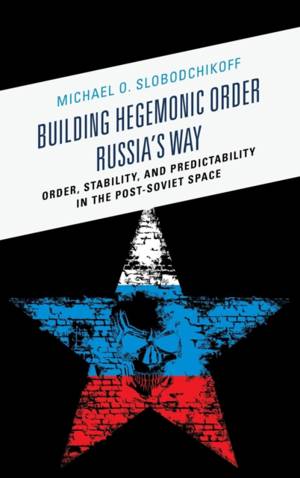
Bedankt voor het vertrouwen het afgelopen jaar! Om jou te bedanken bieden we GRATIS verzending (in België) aan op alles gedurende de hele maand januari.
- Afhalen na 1 uur in een winkel met voorraad
- In januari gratis thuislevering in België
- Ruim aanbod met 7 miljoen producten
Bedankt voor het vertrouwen het afgelopen jaar! Om jou te bedanken bieden we GRATIS verzending (in België) aan op alles gedurende de hele maand januari.
- Afhalen na 1 uur in een winkel met voorraad
- In januari gratis thuislevering in België
- Ruim aanbod met 7 miljoen producten
Zoeken
Building Hegemonic Order Russia's Way
Order, Stability, and Predictability in the Post-Soviet Space
Michael O Slobodchikoff
Hardcover | Engels
€ 184,95
+ 369 punten
Uitvoering
Omschrijving
This book examines Russia's emergence after the collapse of the Soviet Union and its creation of a security architecture in the post-Soviet space. Many scholars argue that Russia is a coercive power in the region that forces states to act in only its own interests. While acknowledging Russia's power this author argues that it is not able to merely force states to behave as it wants them to. Instead, Russia must use bilateral and multilateral cooperation to develop a security architecture that provides order, stability and predictable behavior for both Russia as the hegemon and the weaker powers in the region. By building this security architecture, Russia and the other states in the post-Soviet space are better able to achieve their strategic goals and provide for their own security. To achieve this, weaker states are able to press for certain concessions from Russia regarding how to structure bilateral relations as well as multilateral organizations. While Western politicians have argued that Russia has tried to reestablish the Soviet Union through coercive means, the reality is much more of a nuanced interaction among all of the states in the region, which ensures state sovereignty while allowing the weaker states to pursue their own interests. Using network analysis, this author shows how the regional structural architecture of cooperation was built and indicate how Russia is able to achieve order. This book also shows that there is a lack of order where states have refused to cooperate in building the structural architecture, which has led to conflict and territorial disputes.
Specificaties
Betrokkenen
- Auteur(s):
- Uitgeverij:
Inhoud
- Aantal bladzijden:
- 212
- Taal:
- Engels
Eigenschappen
- Productcode (EAN):
- 9780739185766
- Verschijningsdatum:
- 1/11/2014
- Uitvoering:
- Hardcover
- Formaat:
- Genaaid
- Afmetingen:
- 155 mm x 231 mm
- Gewicht:
- 408 g

Alleen bij Standaard Boekhandel
+ 369 punten op je klantenkaart van Standaard Boekhandel
Beoordelingen
We publiceren alleen reviews die voldoen aan de voorwaarden voor reviews. Bekijk onze voorwaarden voor reviews.









